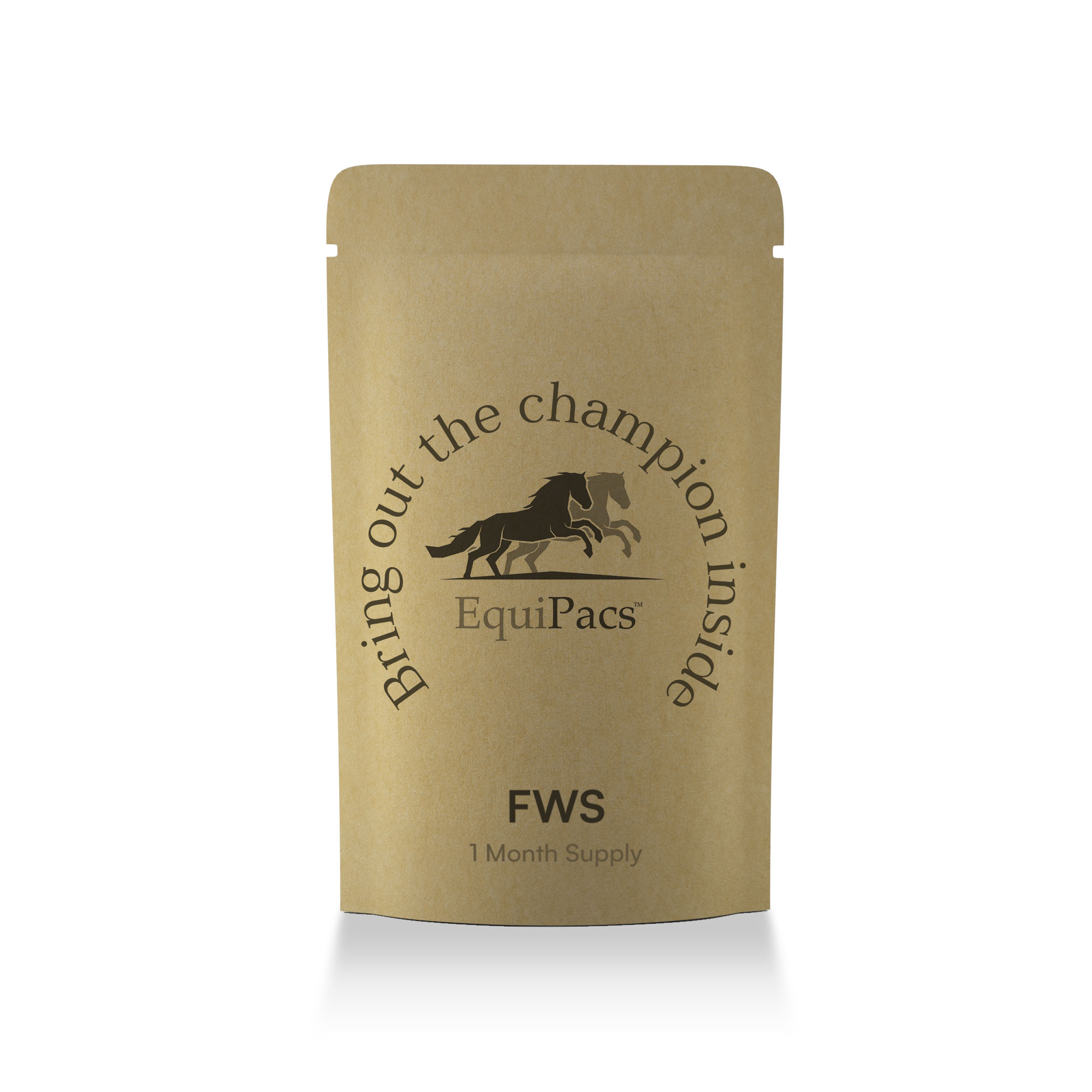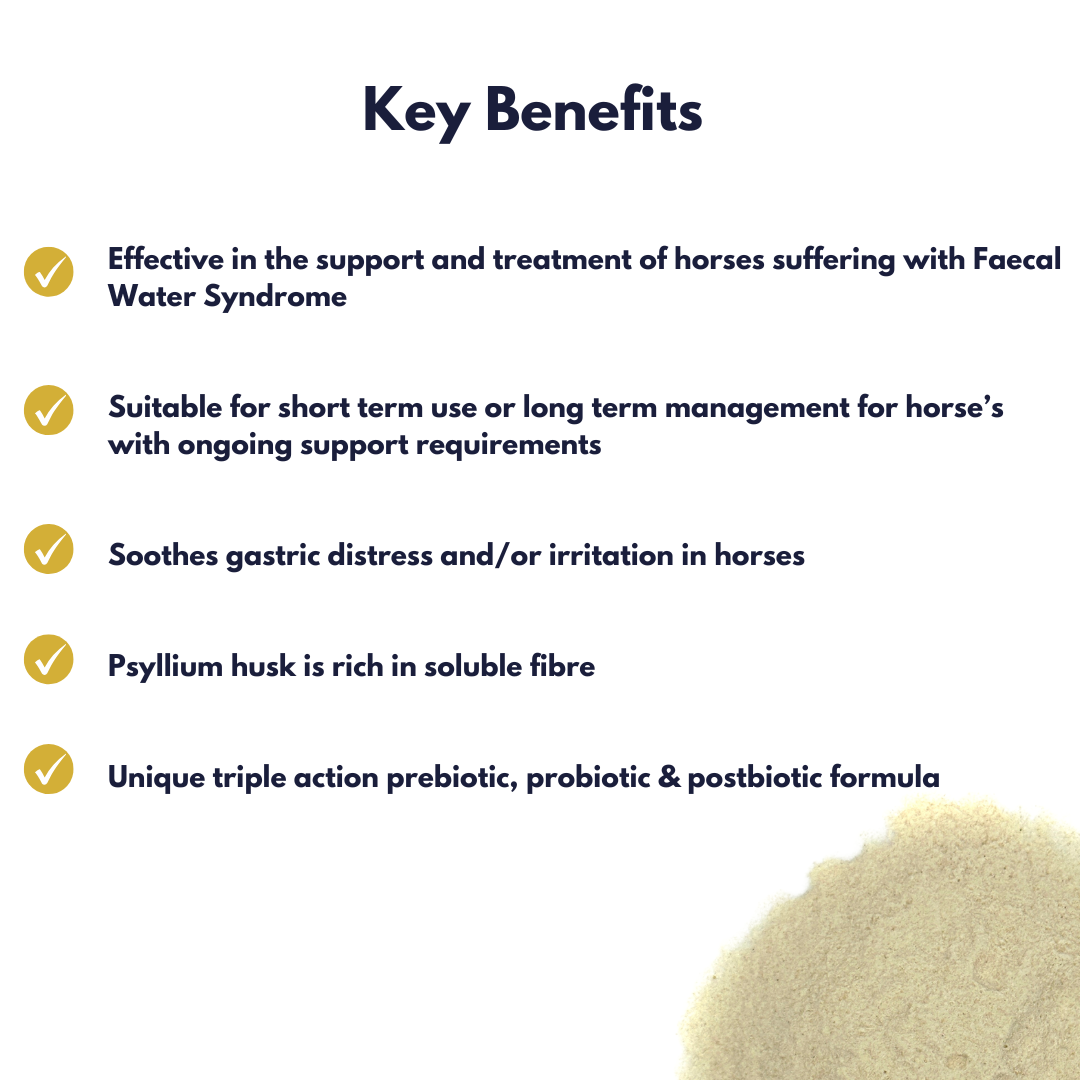FWS
Faecal Water Syndrome affects a variety of horses and is classed as a period where water passes through the... Read More
Faecal Water Syndrome affects a variety of horses and is classed as a period where water passes through the rectum along with faecal matter. This can be caused by sudden changes in diet, grazing, feeding haylage, mycotoxins present in the diet, excessive drinking, or as a side effect from a more complex diagnosis. The continual passing of water can cause an additional host of problems. The syndrome can also cause skin problems or the attraction of flies if the horse is left unclean. Our FWS formula includes the Pre and Probiotics you love from our Digestive Aid but with added Psyllium Husk and Bentonite Clay.
Read LessFrom £31.00
Size
Description
Faecal Water Syndrome affects a variety of horses and is classed as a period where water passes through the rectum along with faecal matter. This can be caused by sudden changes in diet, grazing, feeding haylage, mycotoxins present in the diet, excessive drinking, or as a side effect from a more complex diagnosis. The continual passing of water can cause an additional host of problems. The syndrome can also cause skin problems or the attraction of flies if the horse is left unclean. Our FWS formula includes the Pre and Probiotics you love from our Digestive Aid but with added Psyllium Husk and Bentonite Clay.
Key Benefits
- Mannan oligosaccharides: Prebiotic
- Saccharomyces cerevisiae NCYC 1026: Probiotic
- Saccharomyces cerevisiae: Postbiotic
- Psyllium
- Fibre Source: Psyllium husk is rich in soluble fibre. When ingested, it absorbs water and forms a gel-like substance in the digestive tract. This helps to soften stools and add bulk, making it easier for the horse to pass faeces.
- Sand Removal: One of the significant benefits of feeding psyllium to horses is its ability to help remove sand from the digestive tract. Ingested sand can accumulate in the colon, leading to discomfort and potentially causing colic. Psyllium can bind with the sand particles, aiding in their removal from the gut.
- Prebiotic Properties: Psyllium husk can act as a prebiotic, providing food for beneficial bacteria in the gut. A healthy population of gut bacteria is essential for proper digestion and overall gastrointestinal health.
- Regulating Bowel Movements: For horses prone to loose stools, psyllium can help regulate bowel movements by absorbing excess water and adding bulk to the faeces.
- Colon Health: Psyllium supports overall colon health in horses by promoting regular bowel movements and aiding in the removal of potentially harmful substances like sand.
- Bentonite Clay
- Bentonite clay is a natural substance derived from volcanic ash, known for its ability to absorb toxins and impurities.
- Toxin Binding: Bentonite clay's unique structure gives it a high absorption capacity. It can bind to toxins, heavy metals, and other harmful substances in the gastrointestinal tract, preventing their absorption into the bloodstream. This property is particularly beneficial in mycotoxin exposure or other dietary contaminants.
- Alleviating Gastric Distress: Some horse owners and veterinarians believe feeding bentonite clay may help soothe gastric distress or irritation in horses. Coating the stomach lining, it may provide a protective barrier against stomach acid and irritants, potentially reducing the risk of gastric ulcers or discomfort.
- Aid in Digestive Upset: Bentonite clay is sometimes used to help manage digestive upsets such as diarrhea or colic in horses. Its ability to absorb excess moisture in the gut may help firm up loose stools and restore normal bowel movements. However, it’s essential to address the underlying cause of digestive upset and consult with a veterinarian for proper diagnosis and treatment.
- Improving Digestive Health: Proponents of bentonite clay as a feed supplement claim that it can promote overall digestive health by supporting a balanced gut microbiome. By removing toxins and supporting a healthy microbial environment, bentonite clay may contribute to better digestion and nutrient absorption in horses.
- Sand Colic Prevention: Some horse owners use bentonite clay as a preventive measure against sand colic. The clay’s ability to bind with sand particles in the digestive tract may help prevent their accumulation and reduce the risk of colic associated with sand ingestion. However, other management practices, such as feeding hay off the ground and providing access to grazing on suitable pasture, are also important for sand colic prevention.
- Not suitable for pregnant or lactating mares
Composition
Yeast products derived from Saccharomyces cerevisiae (containing mannan oligosaccharides ), Yeast products derived from Saccharomyces cerevisiae (containing Postbiotics), Vegetal carbon, Calcium carbonate. Yeast products
Feed Additives per KG
Anticaking Agent: Clinoptilolite of sedimentary origin (1g568) 117,162mg Digestibility Enhancer: Saccharomyces cerevisiae NCYC Sc 47 (4b1702) 3.1x10^11 CFU/kg Technological (Binder): Bentonite (1m558i) 8,280mg 2b mixture of flavouring compounds 10,000mg: ethyl hexanoate (2b09060) 30mg, amyl butyrate (2b) 87mg, diethyl malonate (2b09490) 6mg , acetic acid (2b08002) 5.25mg
Analytical Constituents
Crude Protein 25.6%, Crude Fibre 5.9%, Crude Fat 5.36%, Crude Ash 17.6%, Sodium 0.09%, Acid Insoluble Ash 9.44%
Key Ingredients
N/A


